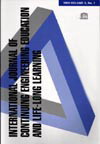
International Journal of Continuing Engineering Education and Life-Long Learning
2002 Vol.12 No.1/2/3/4
Special Issue on New Assessment Methods and Agent-Based Technologies for Autonomous Learning
Part A: New developments in the assessment of learning: where are we? Guest Editors: Professor Carmen Vizcarro and Professor Hans Vos
Part B: Intelligent agents for the learner on the WWW; Guest Editors: Dr. Lora Aroyo and Dr. Piet Kommers